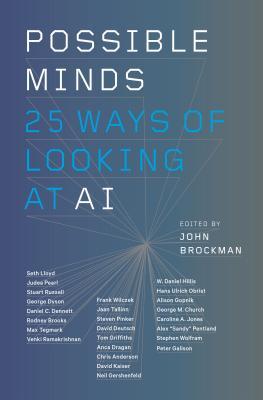 Zusammenfassungen
Zusammenfassungen
 Science world luminary John Brockman assembles twenty-five of the most important scientific minds, people who have been thinking about the field artificial intelligence for most of their careers, for an unparalleled round-table examination about mind, thinking, intelligence and what it means to be human.
Science world luminary John Brockman assembles twenty-five of the most important scientific minds, people who have been thinking about the field artificial intelligence for most of their careers, for an unparalleled round-table examination about mind, thinking, intelligence and what it means to be human. More than sixty years ago, mathematician-philosopher Norbert Wiener published a book on the place of machines in society that ended with a warning: "we shall never receive the right answers to our questions unless we ask the right questions.... The hour is very late, and the choice of good and evil knocks at our door."
More than sixty years ago, mathematician-philosopher Norbert Wiener published a book on the place of machines in society that ended with a warning: "we shall never receive the right answers to our questions unless we ask the right questions.... The hour is very late, and the choice of good and evil knocks at our door."
In the wake of advances in unsupervised, self-improving machine learning, a small but influential community of thinkers is considering Wiener's words again. InPossible Minds, John Brockman gathers their disparate visions of where AI might be taking us.
The fruit of the long history of Brockman's profound engagement with the most important scientific minds who have been thinking about AI--from Alison Gopnik and David Deutsch to Frank Wilczek and Stephen Wolfram--Possible Mindsis an ideal introduction to the landscape of crucial issues AI presents. The collision between opposing perspectives is salutary and exhilarating; some of these figures, such as computer scientist Stuart Russell, Skype co-founder Jaan Tallinn, and physicist Max Tegmark, are deeply concerned with the threat of AI, including the existential one, while others, notably robotics entrepreneur Rodney Brooks, philosopher Daniel Dennett, and bestselling author Steven Pinker, have a very different view. Serious, searching and authoritative,Possible Mindslays out the intellectual landscape of one of the most important topics of our time.
 Dieses Buch erwähnt ...
Dieses Buch erwähnt ...
 Personen KB IB clear | Geoffrey Hinton , Stanley Kubrick , Elon Musk | ||||||||||||||||||
 Begriffe KB IB clear |  AlphaGo
, AlphaGo
,  Gesichtserkennung Gesichtserkennung face recognition
, face recognition
,  Künstliche Intelligenz (KI / AI) Künstliche Intelligenz (KI / AI) artificial intelligence
, Leib-Seele-Problem
, artificial intelligence
, Leib-Seele-Problem
,  machine learning
, open data
, machine learning
, open data
,  Roboter Roboter robot
, survival of the fittestsurvival of the fittest
, robot
, survival of the fittestsurvival of the fittest
,  Synthetische Biologie
, Trolley-Problem
, uncanny valley Synthetische Biologie
, Trolley-Problem
, uncanny valley
| ||||||||||||||||||
 Bücher |
|
 Tagcloud
Tagcloud
 Zitationsgraph
Zitationsgraph
 Zitationsgraph (Beta-Test mit vis.js)
Zitationsgraph (Beta-Test mit vis.js)
 3 Erwähnungen
3 Erwähnungen 
- Ansturm der Algorithmen - Die Verwechslung von Urteilskraft mit Berechenbarkeit (Wolf Zimmer) (2019)


- Klick - Wie wir in einer digitalen Welt die Kontrolle behalten und die richtigen Entscheidungen treffen (Gerd Gigerenzer) (2021)

 Co-zitierte Bücher
Co-zitierte Bücher
 Volltext dieses Dokuments
Volltext dieses Dokuments
 Bibliographisches
Bibliographisches 
 Beat und dieses Buch
Beat und dieses Buch
Beat hat dieses Buch während seiner Zeit am Institut für Medien und Schule (IMS) ins Biblionetz aufgenommen. Beat besitzt kein physisches, aber ein digitales Exemplar. (das er aber aus Urheberrechtsgründen nicht einfach weitergeben darf). Es gibt bisher nur wenige Objekte im Biblionetz, die dieses Werk zitieren.















 Biblionetz-History
Biblionetz-History